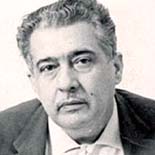 José María Andrés Fernando Lezama Lima (December 19, 1910 – August 9, 1976) was a Cuban writer, poet and essayist. He is considered one of the most influential figures in Cuban and Latin American literature. His novel Paradiso is one of the most important works in Spanish and one of the best novels of the 20th Century according to the Spanish newspaper El Mundo.
José María Andrés Fernando Lezama Lima (December 19, 1910 – August 9, 1976) was a Cuban writer, poet and essayist. He is considered one of the most influential figures in Cuban and Latin American literature. His novel Paradiso is one of the most important works in Spanish and one of the best novels of the 20th Century according to the Spanish newspaper El Mundo.
Lezama is a prominent referent of American Neo-Baroque literature. He created a mature poetic system characterized by its lyricism. His work features a wide variety of metaphors, allusions and allegories which he developed in essays such as Analecta del reloj (1953), La expresión americana (1957), Tratados en La Habana (1958) o La cantidad hechizada (1970).
ANTHONY AND CLEOPATRA
José Lezama Lima
The galleys, arms
crossed over the serpent
and the turquoise eye stained
with saffron dust.
The silky waters
contemplate with silver eyes
the embroidery furrowed along the sails
of the Roman trireme,
with a voluptuousness sweetly
scratching the holes of the flute.
Light splinters when touched
by the prow and the seagull
trembles receiving the unexpected
thrust, that like a finger tickles
the solar breast feathers
interchanging the colors of a bonfire.
The tiara slips at the level of the water
and there it mesmerizes the subdivided smile of sardines.
(Each sardine a nibble at the tiara)
(Each tiara on the volcanoes of the moon
makes a monkey in purple taffeta dance)
Tunics are billowed by the wind
when the bosom accordion keeps time.
The serpent slithers in search of a date, not a nipple,
the ringed index finger guided the bite.
The sorcerer showed the back of his leg,
he wanted to take part in the banquet
and not to read the clouds dissolving their letters.
The messenger startled by eunuchs
murmurs beside the silk galley.
At stern he is covered by an awning
of algae, Horus’s nakedness
resembles death.
The ores splinter over the heads of crocodiles,
make way for the leaps
of the purple-clad monkey.
The galley halts, a crash of cymbals
in the onslaught of each wave.
The serpent leaps on the musicians’ awning.
We say silk galleys
and we shut our eyes.
A millenary reminiscence
moves the serpent again, there
the nipple is reconstructed.
Regard the wood-louse walking the lettuce.
=====
MOTHER
José Lezama Lima
I saw the face of my mother again.
It was a night that seemed to have severed
night from sleep.
The night drew on or halted,
a cutting knife or a hurricane gust,
but the dream didn’t head for its night.
I felt as if everything weighed upward,
you spoke there, almost murmuring,
in the ear of some tiny crab,
alright, I know this because I saw her smile
that wanted to approach to offer me
the little creature,
to watch its amusing crawl
or to plunge it in hot flour.
The ripe corncob like a baby tooth,
in a drawer teeming with silver-plated ants.
The simile of the drawer like a snake,
the size of an arm, a snake rendering slivers
out of the folded length of its tongue, the one
where old watches are kept, the hilarious
frightful talking drawer.
Groping along the door frame,
to begin to feel, covering my eyes,
though eventually motionless,
that what remained was heavier,
with the lightness of what the rain weighs
or the harp’s venetian blinds.
The courtyard was attended
by the entire moon, along with the other invited meteors.
The itinerary of their habit was auspicious and magical.
I watched the door,
but the rest of her body remained subtracted,
like someone who begins to speak,
who laughs again
but who, lingering between the door
and whatever else remains,
seems to have left and then returns.
What’s left is God maybe,
minus myself maybe,
maybe the solar scraping
within which, astride, maybe the self.
At my side, the other body
breathing with eyes
adhered to the rock of this spherical emptiness.
It all began to vanish
into a whirling metal with borders
assaulted by the brevity of flames,
into the steam rising from a tiny
cup of morning coffee,
into locks of hair.